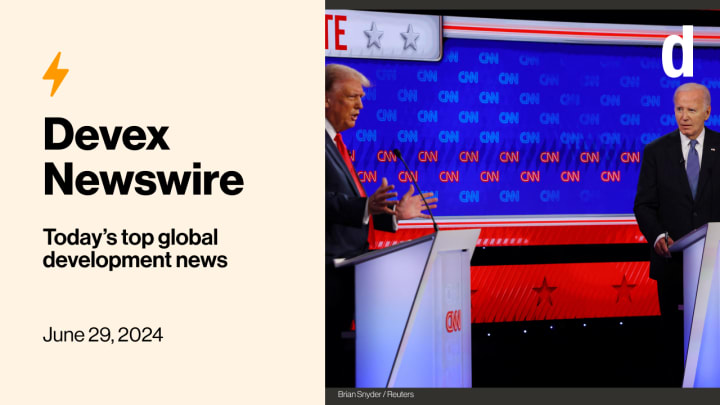
Welcome to a special Saturday edition of Devex Newswire, where we’re getting you caught up on all our essential Devex Pro content, plus fresh stories and tidbits.
Let’s start with the big news of the day, the week, and probably the months to come: the U.S. presidential race between Joe Biden and Donald Trump. Thursday’s debate is the talk of the town — pity a thought for me since I’m based in Washington, D.C., where politics is ALL we talk about on an average day — but it’s also the chatter around the world given how consequential the U.S. presidency is for nearly every corner of the planet. And let’s face it, while Biden would offer the world a fairly conventional presidency, to the reassurance of some and consternation of others, Trump would be a disruptor in every sense — for better or worse.
This is a preview of Newswire
Sign up to this newsletter for an inside look at the biggest stories in global development, in your inbox daily.
Disruption is certainly what the development sector has to brace itself for. So you have to check out my colleague Michael Igoe’s insider breakdown of the transformative changes Trump and company could make to the U.S. aid apparatus, from shutting out the big contractors that tend to win the big contracts, to gutting the overall assistance budget.
It was a must-read before the debate. Now, with many commentators saying a fact-bending Trump bested a halting Biden, it’s an uber-must-read.
Read: The Republican plan to ‘rightsize’ US foreign aid in a Trump presidency (Pro)
ICYMI: A US conservative's plan to beat the 'aid industrial complex' (Pro)
+ For an inside perspective on the U.S. election and what it means for foreign aid, join our Devex Pro Live event featuring Ben Rhodes, deputy national security adviser in the Obama administration, on Monday, July 22. Register now.
Paging USAID
USAID is sure to have a big fat target on its back if Trump wins in November, but before we leap to that hypothetical, let’s see where the agency stands finance-wise today.
As always, we’ve got the very newest figures for you. On June 27, USAID held its latest business forecast call for fiscal 2024 — which previews the agency’s future plans and reports on progress made on current initiatives, including the all-important subject of localization.
My colleague Miguel Antonio Tamonan downloaded the publicly available data right after the call and crunched the numbers to see what the agency plans to prioritize in the coming months.
Overall, the data shows that USAID has a maximum budget of $23.3 billion for 210 anticipated awards in its pipeline. What opportunities are in, which ones are out, and what’s the latest on USAID’s mammoth NextGen suite of health contracts? Become a Devex Pro member to find out.
Read: Inside USAID’s $23.3B business forecast (Pro)
Download: USAID and localization — A progress report (Pro)
+ If you’ve been considering signing up for Devex Pro, now is your chance! For a limited time we’re offering $100 off on an annual Devex Pro membership. Sign up now to access exclusive events, insider articles, in-depth reports, and much more for a full year. Get your discount.
Warren’s will leaves out Bill
In bombshell news, billionaire investor and philanthropist Warren Buffett told The Wall Street Journal that after his death, nearly all of his remaining wealth — and it’s a whole lot of wealth — will go to a new charitable trust overseen by his daughter and two sons.
The interview also confirmed what some had already suspected: that the Gates Foundation, which has benefited from Buffet’s largesse over the years — to the tune of some $40 billion — will get nada once that happens, though it’ll continue getting his annual gift so long as he lives.
“The Gates Foundation has no money coming after my death,” Buffett, 93, bluntly told WSJ.
Ouch.
His three children will have to decide unanimously which philanthropic causes they want their father’s money to go toward.
“It should be used to help the people that haven’t been as lucky as we have been,” he said. “There’s eight billion people in the world, and me and my kids, we’ve been in the luckiest 100th of 1% or something. There’s lots of ways to help people.”
An important note: The Gates Foundation Trust is receiving about $4 billion worth of shares of Buffett’s Berkshire Hathaway Class B shares as of Thursday’s closing price.
“Warren Buffett has been exceedingly generous to the Gates Foundation through more than 18 years of contributions and advice,” the foundation’s CEO, Mark Suzman, said in a statement. “He has played an invaluable role in championing and shaping the foundation’s work to create a world where every person can live a healthy, productive life. We are deeply grateful for his most recent gift and contributions totaling approximately $43 billion to our work.”
+ Our Pro-only Weekender newsletter offers Devex Pro members fun and fascinating tidbits such as these. Sign up to get caught up on what you missed, and to get prepped for your week ahead.
US opens Israel up to some criticism
Whether the U.S. has a Democratic or Republican administration, Israel has typically enjoyed an impregnable shield at the United Nations, thanks to the U.S.’s veto-wielding voting power.
But the Biden administration recently lowered that shield a bit in what was perhaps an expression of frustration with Israel’s unrelenting military campaign in Gaza.
In recent weeks, Israel sought Washington’s help to dissuade U.N. Secretary-General António Guterres from including it in the annual Children and Armed Conflict report, a blacklist of countries and armed groups that have maimed, abducted, or killed children during war.
But the Biden administration rebuffed those pleas, according to four diplomatic sources who spoke to my colleague Colum Lynch for his exclusive piece.
There were some caveats to the diplomatic slight. U.S. officials counseled Guterres and his advisers to be mindful of the risk that Israel might retaliate diplomatically against the U.N. “We also made clear that any equivalence between Hamas and Israel would be entirely unacceptable and misguided,” a U.S. State Department spokesperson told Colum.
Still, it was a rare rebuke.
“This represents the administration’s effort to speak to the Israelis in a slightly coded but public way, to tell them: The days of carte blanche in Gaza are over,” Hussein Ibish, a senior resident scholar at the Arab Gulf States Institute, told Colum. “The U.S. is looking for points of leverage that don’t strengthen Hamas or that don’t indicate a lack of sincerity in combating attacks on Israel.” Among the key messages the U.S. is trying to send: “Wrap up Gaza if you want our continuing support. Let in humanitarian aid, finish up Rafah as soon as possible with the least amount of death and damage.”
Exclusive: US rebuffs Israeli rogues list plea (Pro)
The ABCs of DFC and MCC
Two aid-related agencies seem to have broken through the partisan wall in the U.S. Congress to enjoy a decent helping of bipartisan backing.
First up, the U.S. International Development Finance Corporation. We hosted an expansive discussion on DFC’s future — including the reauthorization of the BUILD Act that established the agency in 2019 — with DFC chief Scott Nathan and others at a recent event in Washington, D.C.
It included current Rep. Andy Kim, a Democrat from New Jersey, and former Rep. Ted Yoho, a Republican from Florida who helped co-author the BUILD Act. Granted, it was a tiny congressional sampling, but if Kim and Yoho are anything to go by, there is tangible support among lawmakers of both political stripes to reauthorize the BUILD Act at some point.
Both Kim and Yoho heaped praise on DFC not only for being a nimble anti-bureaucracy, but also for serving a variety of missions — among them, acting as a counterpoint to China’s Belt and Road Initiative, reinforcing U.S. national security by shoring up alliances, tapping the private sector to build sustainable growth, and helping countries prosper.
“We get value out of this. This isn't charity,” Kim said. “This is about our sense of what our country stands for and our ability to try to impact others.”
Meanwhile, the Millennium Challenge Corporation has also earned bipartisan praise — and is hoping to capitalize on that praise to expand its mandate.
My colleague Adva Saldinger had an in-depth conversation with Alice Albright, head of MCC, who spoke about the need to grow the number of countries the agency works with as it marks its 20th anniversary.
During those two decades, MCC has earned a solid reputation for its large grants, or “compacts,” that have strengthened the economic growth of nations with records of good governance. Now, Albright wants to broaden the income-based restrictions placed on it by Congress — and she relishes the funding fight ahead.
“I love arguing and advocating for money for international development, like bring it on, I totally love it,” she said.
Read: US Development Finance Corporation hopes to BUILD on its future (Pro)
Also: At the helm of MCC, Alice Albright navigates storms, relishes the fight (Pro)
Sign up to Newswire for an inside look at the biggest stories in global development.




